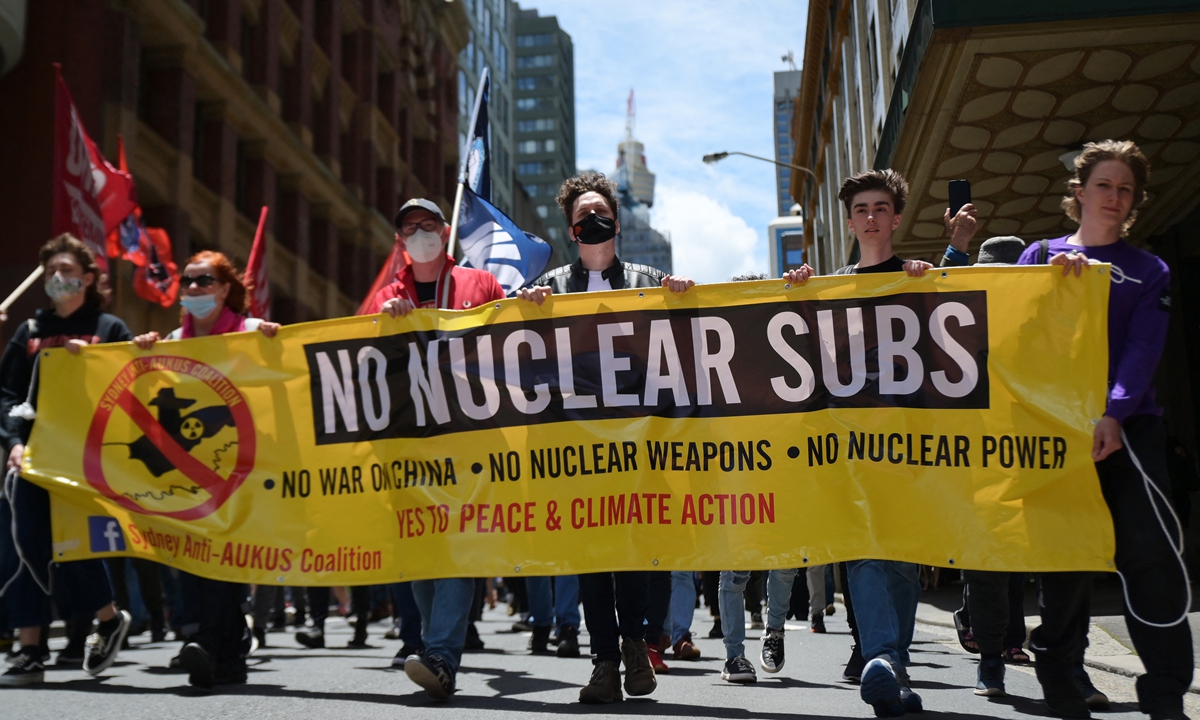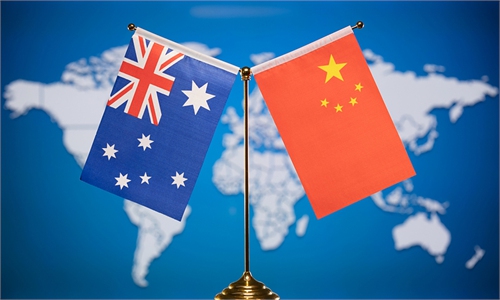Former senior Australian officials criticize drift on China policy, AUKUS

Members of the Sydney Anti-AUKUS Coalition (SAAC) participate in a protest in Sydney, Australia, on December 11, 2021 against the nuclear submarines deal among AUKUS members. Photo: AFP
There are continuous objective and rational voices in Australia, including those from the country's former prime minister Paul Keating, hoping to rectify the Albanese administration's drift on China policy and the strategy of blindly following the US, Chinese observers said, after Keating hit out at G7 and the Quad for not including and "trying to contain China." Keating also urged the government to withdraw from AUKUS.
The Albanese administration has been in place for half a year, so it has not really formed its foreign policy and security policy and it is still following the old track of the former Morrison administration, said Chinese observers. Views of some senior Australian politicians including Keating and former foreign minister Bob Carr are valuable and hopefully the current administration can listen carefully and get back on the right track, Chinese observers said.
Meanwhile, the observers remain cautious about whether the current administration will accept suggestions from the senior politicians.
On Wednesday night, Keating, 78 - who served as the Australian leader from 1991 to 1996 - appeared at Melbourne's La Trobe University where he said "it would be a tragedy for Australia" if the current ruling Labor Party pushed ahead with the AUKUS security partnership as the US is "exceptionally ungrateful," Australian media outlet Sky News reported.
According to the report, AUKUS - a trilateral security pact signed with the US and UK in September 2021 under the former Morrison government - would see Australia collaborate with the nations to acquire at least eight nuclear powered submarines.
But Keating warned it is "not intelligent" for Australia to be "owned by the US" and argued Labor should have consulted him before backing the move, the report said.
In 2021, the senior Australian politician criticized Labor for backing the then Morrison administration's plan for nuclear powered submarines, as the plan was detrimental to Australia's long-term national interests in many respects, Chen Hong, president of the Chinese Association of Australian Studies and director of the Australian Studies Centre at East China Normal University, cited the news report as saying.
And now ahead of the next round of talks on the submarine deal, Keating again expressed his concerns over AUKUS, which is timely and appropriate, Chen said.
The former Labor leader also condemned the Quad security dialogue with the US, Japan and India, as well as the G7 for not including China as one of its members. Keating argued the dialogue is "a piece of strategic nonsense" and said Australia "shouldn't be stringing together" with the other countries to "try to contain China."
He said China is one of the most powerful and influential nations in the world and Beijing could bring "stability" like it had in Asia, stating that "the Chinese are not trying to overturn the existing system. Let's get this clear: China is not the Soviet Union. It is not exporting ideology."
Given that China has been Australia's largest trading partner and the two countries have enjoyed a comprehensive strategic partnership, in terms of trade, security and political interests, maintaining a good relationship with China is certainly beneficial for both China and Australia as well as regional stability and prosperity, Chen pointed out. Blindly following the US to suppress China and provoke China on sensitive issues such as the Taiwan question is foolish, Chen warned.
As the Albanese administration is still very young and appears to be stuck in a dilemma in choosing its future direction, comments from Keating can give the government some help, Chen said.
An editorial published by the Australian Institute in November, 2021 said that the former prime minister "has a powerful sense of Australia's national interest (its identity and power), and always filters his views through the lens of how that national interest is best promoted and protected."
However, in November 2021, although Albanese had told reporters he always listened to Keating as a respected former leader, he made it plain that he did not share the assessment of the strategic circumstances Australia now faces.
Whether Albanese can carefully listen to Keating's comments is still unclear, and we are waiting to see where the China-Australia ties will go, observers said.
Keating is not the only senior politician to express his opinions recently about how Australia should best protect its national interests.
Former foreign minister Bob Carr was quoted in July by Sky News as saying that he was hopeful Australia's diplomatic relationship with China could be restored under an Albanese Government after a tumultuous two-and-a-half years.
The Chinese mission to the UN in Vienna on September 30 fully thwarted an amendment advocated by the three countries which form the AUKUS alliance which aimed at legalizing their nuclear-submarine cooperation at the 66th annual International Atomic Energy Agency (IAEA) General Conference held in Vienna from Monday to Friday, the Global Times learnt from the Chinese mission to the UN.


